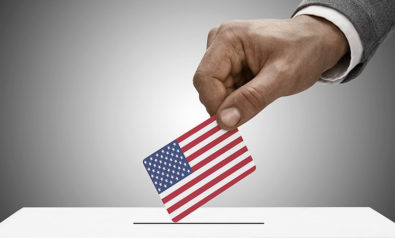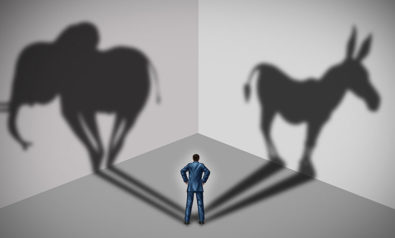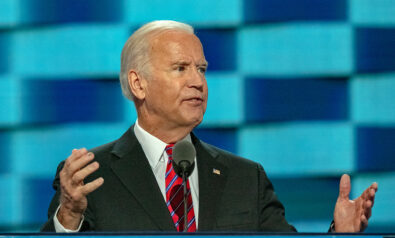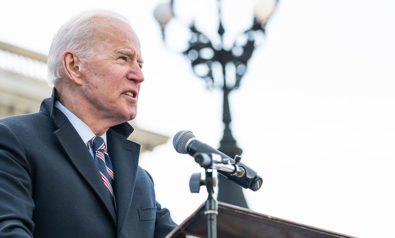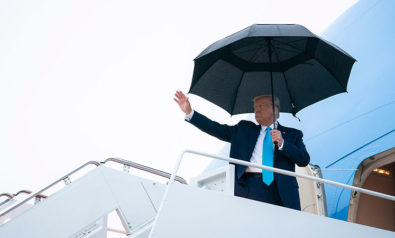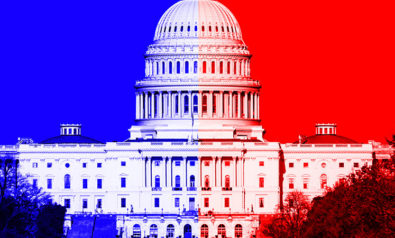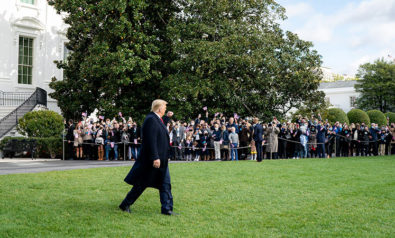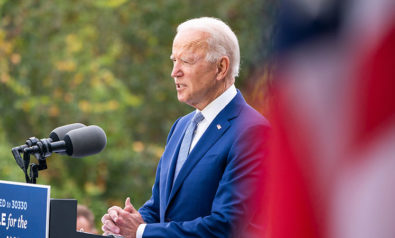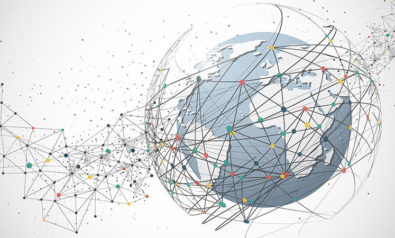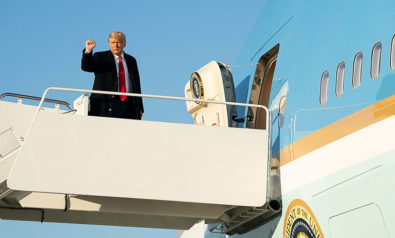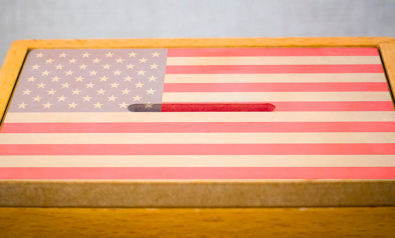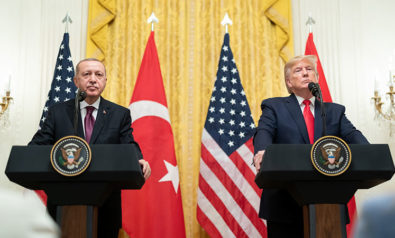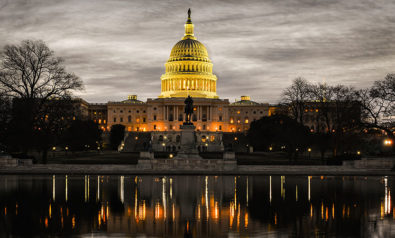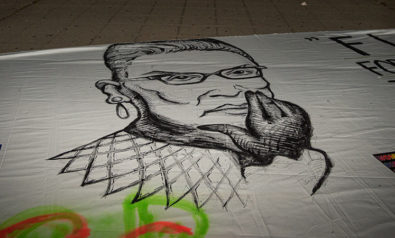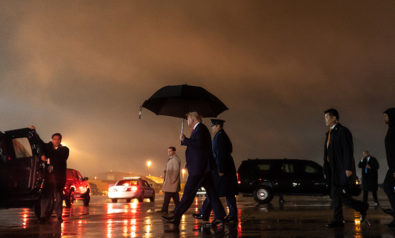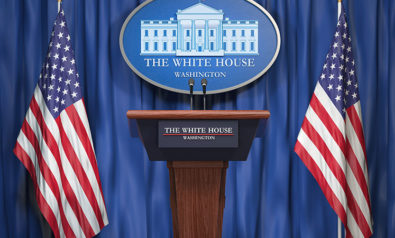In December 2007, Mwai Kibaki beat Raila Odinga in the Kenyan general election and all hell broke loose. Odinga’s supporters took to the streets, alleging Kibaki had “stolen” the election. Police fired on demonstrators and some died. In retaliation, the targeted ethnic cleansing of Kikuyus, Kibaki’s community, began.
The Kikuyus themselves responded by targeting other communities. A bloodbath ensued. The New York Times observed that “ethnic violence, fueled by political passions” was threatening to ruin the reputation of a country regarded as one of the most promising in Africa. It turns out that this promise was illusory. Rival ethnic groups within arbitrary colonial borders were held loosely together by self-interest and little national identity. The country was held together with string.
360° Context: The 2020 US Election Explained
About 20 years ago, Stephen Heiniger, then a British policeman, visited a dear friend in New York. Like my view of Kenya, he observed that New York was held together with string. The Guatemalan who worked in a restaurant’s kitchen had little in common with the owner. He did not really identify with New York or even the US. The immigrant was slaving away to make money to send back to his family, socializing largely with people from his part of the world.
What Heiniger observed about New York 20 years ago is increasingly true for America today. The country is full of such loose groups held together by self-interest. This is largely defined in terms of success, which in turn is mainly measured by money. A strong social, regional or national identity and common purpose in a large, diverse and unequal land is increasingly lacking.
In the 2020 presidential election, America might be about to emulate Kenya. Political passions run so strong that the threat of violence looms high. Not since the Civil War ended in 1865 has America been so divided. The reputation of a country long considered the most promising in the world faces damage, if not ruin.
The Mother of All Elections
Michael Hirsh, the deputy news editor of Foreign Policy, thinks this is the most important election ever. It is more important than the seminal elections of 1800, 1860 and 1932. These led to the triumphs of Thomas Jefferson, Abraham Lincoln and Franklin D. Roosevelt respectively, changing the course of history. In each of these elections, America was divided but managed to hold together and move forward.
Hirsh argues that the 2020 election is the most significant because President Donald Trump has damaged institutions of American democracy to such a degree that the future of “the 244-year-old American experiment of a republic of laws” is at stake.” He blames Trump for openly encouraging racial violence, stoking division and failing to contain the COVID-19 pandemic.
Hirsh reflects the unease of many members of the American elite. For a long time, they have self-consciously thought of themselves as a modern-day Rome. Now, they fear that America could end up “as just another abject discard on the ash heap of failed republics going back to ancient Rome and Greece.”
As during the times of the Cold War, Americans fear an enemy. This time it is another communist country, a former ally named the People’s Republic of China. Hirsh believes the US is stumbling precisely at “a moment when [it] has lost its material preponderance” to China. Its “central place in stabilizing the global system” is on the ballot.
The Economist shares Hirsh’s view. It makes a case for Democratic nominee Joe Biden in a breezy editorial that seems to have been penned in the Oxford Union. It declares Biden not to be the miracle cure for what is ailing America but a good man needed to “restore steadiness and civility to the White House.”
Media organizations from The New York Times to The Times of India agree upon the importance of the 2020 election. They have published millions of words on the subject and sought out pollsters to predict the election outcome. As the day of reckoning draws nigh, campaigning has reached fever pitch. Candidates for the House of Representatives, the Senate and the White House are all summing up their final arguments to Americans who have not voted yet. Even as citizens go to the polls on November 3, the Senate has confirmed Amy Coney Barrett to the Supreme Court, giving conservatives a 6-3 majority over liberals. Everything is on the ballot in 2020, including and especially the courts.
To understand the presidential election, it might be useful to cast our eyes to an event 30 years ago. In August 1990, Iraq’s Saddam Hussein “invaded and annexed Kuwait.” The US swung into action to liberate an oil-rich country that its cash-poor neighbor had gobbled. Hussein threatened “the mother of all battles” but suffered abject defeat. This was a heady time for the US. The Berlin Wall had fallen. George H.W. Bush had come to the White House promising “a kinder and gentler nation” and “no new taxes.” Ronald Reagan’s revolution of getting the government off people’s backs and bringing the Soviet Union to its knees seemed to have succeeded. By the end of 1991, the Soviet Union had collapsed.
President Bush had presided over the ultimate triumph of America. The dreaded Cold War with its specter of nuclear destruction was finally over. America’s liberal democracy and free market economy were deemed the only way forward. Francis Fukuyama waxed lyrical about the end of history and humanity was supposed to enter the gates of paradise, with all earthlings securing unalienable rights of life, liberty and the pursuit of happiness.
After a spectacular victory in the Gulf and the glorious subjugation of the Soviet Union, Bush should have romped to victory in the 1992 election. Instead, he lost. The economy had been slowing and deficits had been growing, forcing Bush to raise taxes. Many Americans went apoplectic. They could not forgive the president for breaking his promise. There was unease even then with the new era of globalization that Bush kicked off.
In that election, Texan billionaire Ross Perot made a dash for the White House campaigning against this brave new world. He warned against “shipping millions of jobs overseas” because of “one-way trade agreements.” Perot argued that countries with lower wages, lesser health care or retirement benefits and laxer environmental laws would attract factories away from American shores. With the North American Free Trade Agreement (NAFTA) on the cards, Perot famously predicted “there will be a giant sucking sound going south.” Perot did not win, but he took enough votes away from Bush to pave Bill Clinton’s primrose path to the White House.
In 2020, Trump is running for a second term as Perot’s angry child. He has jettisoned “bad” trade deals like NAFTA and the Trans-Pacific Partnership (TPP). Biden is the successor to Bush and Clinton. He was vice president when the US negotiated the TPP. The die is cast for a clash between two radically different visions for the future.
Who Will Win?
In 2016, I had an uncanny feeling that both Brexit and Trump’s triumph were not only possible but probable. In February that year, I examined the UK’s troubled marriage with Europe and argued that British Prime Minister David Cameron had promised more than he delivered, which would cause him problems later. In July, I posited that we could soon be living in the age of Trump because of increasing inequality and rising rage against entrenched elites.
I followed the two articles with a talk at Google in August on the global rise of the far right. Aggrieved by the superciliousness of journalists based in New York and Washington, I resonated deeply with the “left-behind” voters. They believed that American elites had turned rapaciously parasitic and sanctimoniously hypocritical. It seemed inevitable that some Pied Piper would lead a populist reaction.
In 2020, I do not have my finger on the pulse in the same way as in 2016. Social distancing and limited travel in the era of COVID-19 has made it difficult to estimate what really is going on. Besides, Americans say radically different things depending on which candidate they support. Often, they are very guarded or say little, making it hard to judge what is truly happening.
Democrats seem convinced that the nation is horrified by four years of a Trump presidency. They see him as crass, racist, misogynist, dishonest and deeply dangerous. Democrats believe that Americans will punish Trump for damaging institutions, spreading hatred and lowering the dignity of his office. Opinion polls give the Democratic Party a handsome lead even in some key battleground swing states. Pollsters were wrong in 2016, but they might have improved their methods since. Therefore, Democrats believe that they could retain their majority in the House of Representatives, flip the Senate and win back the White House.
Republicans do not seem to have much faith in these polls. Many are confident of another close victory. They predict losing the popular vote but winning the Electoral College. Republican strategists are banking on the silent white vote to turn out in their favor. Many voters are uncomfortable with the Black Lives Matter movement, calls to “defund the police” and prospects of higher taxes. They fear Biden to be a Trojan horse for the culture warriors of the far left led by Kamala Harris, his running mate. They worry about identity politics and the strains it places on the social fabric. Republicans also hope to pick up minority support from Hispanics who oppose abortion, Indians who back Trump’s good friend Narendra Modi, Taiwanese who hate China and others.
Making Sense of Donald Trump
When I speak to Americans, one thing is clear. This election is a referendum on President Trump. His manifest flaws have been chronicled by numerous publications and innumerable late-night comedy shows. Yet Trump still retains the trust of many Americans. Why?
The best answer came from some militia members I spoke to in West Virginia. They conceded that Trump lies but gave him credit for telling one big truth: Things had turned much too ugly for far too many people like them.
Some of these militia members were veterans who had served in Iraq and Afghanistan. They were filled with a burning sense of injustice. These gentlemen had withering contempt for the likes of Paul Bremer, Paul Wolfowitz and John Bolton who served President George W. Bush. They viewed wars abroad as a criminal waste of American blood and treasure. These war veterans pointed out that Bremer, Wolfowitz and Bolton had been courtiers who climbed up the Washington greasy pole without ever serving in uniform. They remarked that Bush himself was a draft dodger who wriggled out of serving in Vietnam because of his father but sent others to die on foreign shores.
These West Virginians went on to say that their children had few prospects. Since 1991, working-class jobs have left for China. So, their children need a good education to compete for the few decent jobs in the services sector. However, they study in schools with few resources and overstretched teachers.
The militia members’ argument is simple but powerful. Only children who study in private schools or state schools in districts where houses cost a million dollars or more get into top universities, which cost a mere $300,000 or so for an undergraduate degree. Affluent foreign students also make a beeline for America after high school. Such is the competition that most parents hire expensive admissions consultants for their children. So, those who come from hardworking ordinary American families are simply outgunned.
The celebrated entrepreneurs of the US might be dropouts, but top corporates hire largely, if not exclusively, from top universities. The West Virginians pointed out that, before Barrett’s nomination, “all nine justices of the nation’s highest court would have attended law school at either Yale or Harvard universities.” Those who go to posh schools and top universities effortlessly enter the cushy salaried class. They can walk in and buy a million-dollar home with a tiny down payment. All they need apart from their job is a good credit score. In contrast, ordinary Americans live paycheck to paycheck.
One militia member went on to discuss the bailout in some detail. He told me he had voted for change twice but got more of the same instead. This gentleman blamed President Barack Obama for caving in to Wall Street. He said veterans struggled to get by while bankers got big bonuses from taxpayer money. For him, this showed that Democrats had sold out to Wall Street. He declared that fortunes of the new feudal superclass have been made through the serfdom of an ever-increasing underclass. In his memorable words, the system has “f**ked us over. Now, we will f**k it up.”
The West Virginians brought to life many arguments I have made over the last decade. In July 2013, I argued that increasing inequality, lack of access to quality education and an erosion of liberty were chipping away at the very basis of the American dream. Over the years, I have cited many studies that chronicled how America was becoming more unequal. In fact, inequality of both income and wealth has worsened even more during the COVID-19 pandemic. Note the economy has tanked but stock markets have stayed high. Social mobility continues to plummet. Poverty is shooting up dramatically. So is hunger. Surviving the terrible American nightmare has become more of a reality than achieving the great American dream.
Such developments have led to much anger. In an eloquent interview, Trump supporter-turned-opponent Anthony Scaramucci explained why the president won the support of the white working class in places like West Virginia, Wisconsin and Michigan in 2016. For this class, the television celebrity was “an avatar to express their anger.” In rural and suburban areas, blighted factory towns and rundown neighborhoods, Trump was the “orange wrecking ball” to “disrupt and change the system.”
Another interview by Trump’s former strategist, Steve Bannon, is equally instructive. He rightly says that the American economy is no longer based on capitalism but on neo-feudalism. This former Goldman Sachs highflier argues that the underclass and the superclass don’t pay for anything. The working and middle class are left taking the tab. Quantitative easing (QE) might have saved the economy from collapse but has largely benefited the wealthy. In a clever turn of phrase, Bannon calls QE the bailing out of the guilty who had crashed the system itself. Trump is a “very imperfect instrument” for this populist revolt.
Likable Uncle Joe and Dancing Kamala
Many Republicans tell me that they like Biden. They think he is a good and likable man. These folks have reservations about his son Hunter but admire his late son Beau who served in the US Army. However, Republicans fear Biden could be turning senile and Harris would be the real power behind the throne. They reserve their special ire for Harris who they damn for practicing identity politics. Even many Democrats are uncomfortable about her cozy relationships with the Silicon Valley mafia who Americans feel care more about India than Indiana.
For many Republicans, Harris is a disingenuous elitist who plays the race card to win votes and sympathy. She had no compunctions putting young black men into jail for minor crimes as a prosecutor to further her political career. They detest the fact that Harris played the race card against Biden during the Democratic presidential primaries. She made a big deal about his opposition to mandatory busing of colored children to largely white schools. Now, Harris is merrily dancing her way to the White House on a presidential ticket with the same man she excoriated not too long ago. Politics is a bloodsport, but some find Harris a bit too canny and bloodthirsty.
Biden’s supporters take a different view. They think he is still in good health and has good judgment. As per The Economist, the former vice president is “a centrist, an institutionalist, a consensus-builder.” He is exactly what the doctor ordered for a deeply-traumatized nation. Biden will not only steer the Democratic Party forward but also get rid of the scourge of Trump for the Republicans. Decency and civility will return to public life and the White House. Many point to Biden’s impassioned 1986 speech against the Reagan administration’s support for the South African apartheid regime as evidence of his deep commitment to equality and justice.
Democrats see reservations against Harris as evidence of America’s deep-seated sexism and racism. With Indian and Jamaican parents, Harris is multiracial like Obama. For many, she is the future of America. She could be the first woman vice president, breaking the key glass ceiling. Immigrants like her parents provide America the talent to stay top dog. As long as Sundar Pichai, Elon Musk and John Oliver make a beeline for America, Uncle Sam will triumph over the Middle Kingdom.
Democrats make good arguments for the Biden-Harris ticket, but they lack the passion Trump supporters displayed. The fervor of the 2008 Barack Obama or the 2016 Bernie Sanders campaigns is distinctly missing. Democrats are not offering a clear vision or a program for the future. They are running on kicking out Trump and restoring American democracy. It remains to be seen if this will enthuse working-class voters to switch their support to the party of Roosevelt.
Another Battle in a Long War
Both Biden and Trump have declared they are fighting for America’s soul. It is the mother of all battles in what could prove to be a protracted war. The country is now economically, educationally, socially, culturally and virtually divided. The division that cable news networks exacerbated a few decades ago is now on steroids thanks to social media. Algorithms have created filter bubbles and echo chambers. People see more and more of the same. In the post-truth world of fake news, people cannot even agree upon basic facts.
In this unequal and polarized world, institutions are falling short. Congressmen who face reelection every two years are constantly fundraising. They have little time to write laws or hold the executive accountable. Senators often stick around forever, some until they die. Partisanship is so intense that little gets done. Judges are increasingly appointed on partisan grounds and this is damaging their legitimacy.
At the heart of the matter is a simple question: What holds America together? Bannon has a point when he says that immigration and trade benefit the affluent by lowering costs and raising profits. If hedge funds in Greenwich, Connecticut and internet oligopolies in Silicon Valley, California invest globally and move money through complex legal structures in different countries, what do they have in common with a plumber in Hattiesburg, Mississippi or a carpenter in Great Falls, Montana?
After the ethnic cleansing in 2007-08, Kenyan leaders signed a power-sharing agreement and the country drifted back to normalcy. As Kenya gears up for elections in 2022, fear and loathing are in the air again. The dormant divisions in this former colony threaten to erupt. The same is true for America. Young black men suffer violent policing and mass incarceration in America’s unjust criminal justice system. The white working class feels betrayed. The woke generation wants to upend the old social order. Feminists want to burn down the patriarchy. Catholics and evangelicals aim to outlaw abortion. With America’s different tribes pulling in different directions, things are truly held together with string.
The views expressed in this article are the author’s own and do not necessarily reflect Fair Observer’s editorial policy.
Support Fair Observer
We rely on your support for our independence, diversity and quality.
For more than 10 years, Fair Observer has been free, fair and independent. No billionaire owns us, no advertisers control us. We are a reader-supported nonprofit. Unlike many other publications, we keep our content free for readers regardless of where they live or whether they can afford to pay. We have no paywalls and no ads.
In the post-truth era of fake news, echo chambers and filter bubbles, we publish a plurality of perspectives from around the world. Anyone can publish with us, but everyone goes through a rigorous editorial process. So, you get fact-checked, well-reasoned content instead of noise.
We publish 2,500+ voices from 90+ countries. We also conduct education and training programs
on subjects ranging from digital media and journalism to writing and critical thinking. This
doesn’t come cheap. Servers, editors, trainers and web developers cost
money.
Please consider supporting us on a regular basis as a recurring donor or a
sustaining member.
Will you support FO’s journalism?
We rely on your support for our independence, diversity and quality.



